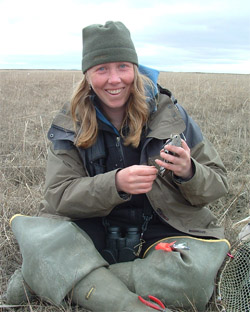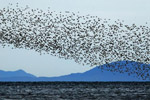
Shorebird Research at the CWE

Over Ocean Flocking

Over the past two decades, we have observed a dramatic increase in over-ocean flocking by wintering shorebirds at Boundary Bay, near Vancouver, BC. We believe this functions as an anti-predation strategy during high tides. To view a short video exploring this behaviour by large flocks of wintering Dunlin click here.
Major aspects of work by the CWE on shorebirds:
- feeding-predation danger tradeoffs, particularly at migratory stopover sites
- migratory connectivity using stable isotopes, trace elements, and genetics and morphology
- breeding biology in Alaska
- field studies on the wintering grounds in Colombia and Peru
- diet, particularly adaptations to feeding on biofilm
- modeling migration strategies
- documenting and explaining differential migration distribution of age and sex classes during the non-breeding season
For more information on current work being done by CWE researchers on shorebirds, contact David Lank or Ron Ydenberg.

